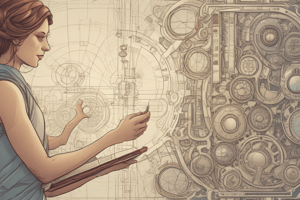Podcast
Questions and Answers
What does Science and Technology Literacy (STL) include?
What does Science and Technology Literacy (STL) include?
The ability to apply scientific and technological concepts, use the process skills, and embrace science attitudes and values in life.
Which of the following is NOT one of the important components of scientific literacy?
Which of the following is NOT one of the important components of scientific literacy?
- Developing and Demonstrating Scientific Attitude and Values
- Development of Artistic Skills (correct)
- Understanding and Applying Scientific Knowledge
- Performing Scientific Inquiry Skills
A scientist must be _____ about the world.
A scientist must be _____ about the world.
curious
Intellectual honesty is considered a scientific attitude.
Intellectual honesty is considered a scientific attitude.
What is one attribute that science learners should develop according to the framework?
What is one attribute that science learners should develop according to the framework?
What does the Science-Technology-Society (STS) approach examine?
What does the Science-Technology-Society (STS) approach examine?
Match the following attributes to their descriptions:
Match the following attributes to their descriptions:
Flashcards are hidden until you start studying
Study Notes
The Science Framework in K to 12
- The national framework emphasizes Science and Technological Literacy (STL) as a component of 21st Century Literacy.
- STL encompasses understanding and applying scientific concepts, employing process skills, and adopting scientific attitudes and values.
Components of Science Literacy
-
Understanding and Applying Scientific Knowledge
- Emphasizes the necessity of comprehension alongside memorization of scientific facts, ideas, and theories.
- Knowledge should be applicable in daily life to enhance learning relevance.
-
Performing Scientific Inquiry Skills
- Involves a systematic approach to investigating questions, crucial for conducting scientific inquiries.
- Students learn to perform investigations and refine their cognitive outcomes through inquiry.
-
Developing and Demonstrating Scientific Attitudes and Values
- Curiosity about the world leads to discovery.
- Attributes of a scientist include humility, open-mindedness, intellectual honesty, perseverance, skepticism, creativity, rational thinking, objectivity, and innovation.
Essential Attributes for Science Learners
-
Critical and Creative Problem Solvers
- Ability to analyze complex problems and devise innovative solutions.
-
Responsible Stewards of Nature
- Commitment to environmental protection and awareness of ecological responsibilities.
-
Innovative and Inventive Thinkers
- Encouraged to generate new ideas and contributions to society through science.
-
Informed Decision Makers
- Development of skills to make discerning choices, especially as independent learners.
-
Effective Communicators
- Capability to articulate scientific findings clearly in both written and oral formats.
Teaching Approaches to Develop Skills
-
Multidisciplinary and Interdisciplinary Approach
- Integrates multiple subject areas to enhance understanding, exemplified by combining Science with History in lessons about discoveries.
-
Science-Technology-Society (STS) Approach
- Explores the interplay between scientific advancements, technology, and their societal impacts, shaping cultural and environmental considerations.
-
Problem/Issue-Based Learning (PBL)
- A learner-centered method focusing on solving real-world problems, promoting deep learning and engagement with content.
Studying That Suits You
Use AI to generate personalized quizzes and flashcards to suit your learning preferences.




